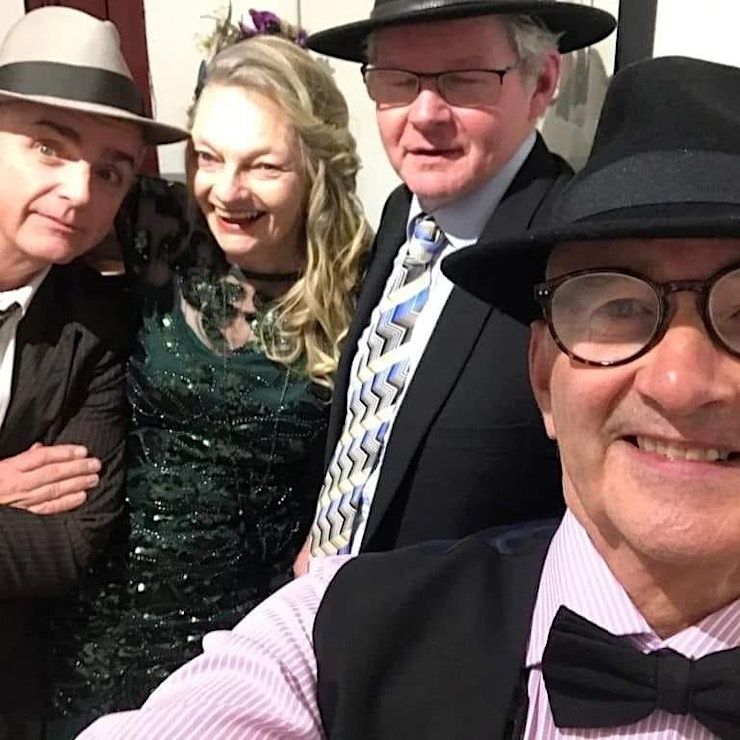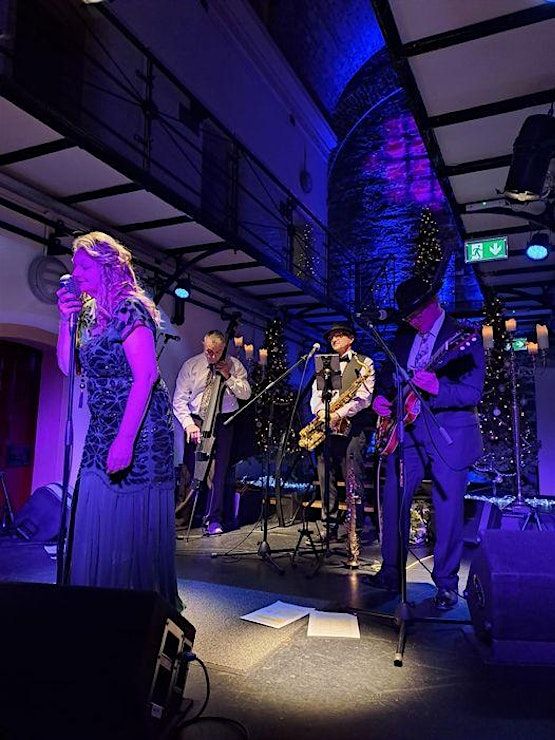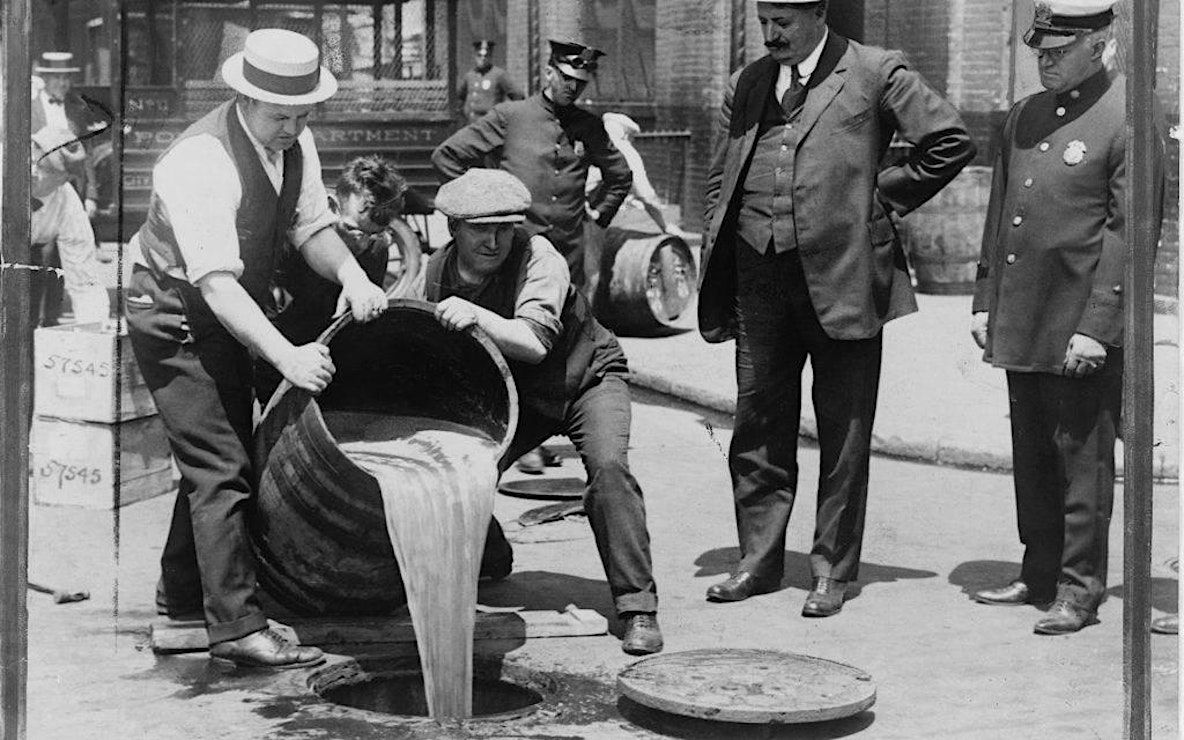Speakeasy Night in the Gaol
Schedule
Sat Feb 15 2025 at 08:00 pm to 11:00 pm
UTC+00:00Location
Oriel Centre, Dundalk Gaol | Dundalk, LH

About this Event
After a sell out show last yearin the Oriel Centre, Dundalk Gaol, The Two Five Ones are back. Enjoy a Speakeasy experience in the beautiful setting of The Oriel Centre in Dundalk as vintage jazz and blues duo, The Two Five Ones and guests take you back in time with music from the 1920s right through to the 1950s ....and beyond. This is a cabaret style event and is guaranteed to get you in a swing! Costume dress up is encouraged if you want to really get into the spirit of the prohibition period. So dust off your flapper dress and your fedora and enjoy a night out with a difference!
The Two Five Ones consist of Dara MacGabhann (vocals) and Andy Hogg (finger style guitar). Their repetoire spans music from the 20s, 30s, 40s and 50s along with some of their own original compositions from the two studio albums. Special guests on the night will include Alex Watson (upright bass) and John Cosgrove (saxophone) and guest vocalist Aoibhín Ní Ghabhann.
Feel free to dress in costume - but don't feel pressurized. (Mind you if last year is anything to go by there will quite an array of style on the night!
Testimonials from last year's Speakeasy Night in the Gaol:
''Captivating night in old Dundalk Gaol . We had magical music, stunning singing and a relaxed charming atmosphere. The songs were a trip down memory lane and the whole evening gave us a wonderful feel good factor. Dressing in 1920 style really added to the fun and provided a unique experience.''- Attracta
''I would like to share a note to let you know how much I enjoyed the Speakeasy Night in Dundalk Gaol last year. I’m really excited for the event again this year. The setting is rare to say the least, but very astute for the event. The band are so talented and gave variety with a number of guest singers also. You don’t have to dress up in 1920’s to enjoy but it definitely added to our experience and don’t be afraid to get up and dance, there is no prohibition on dancing.'' - Pearl
Follow them out on facebook; https://www.facebook.com/thetwofiveones/



We are very excited to have the talented Aoibhín Ní Ghabhann performing at this year's Speakeasy Night in the Gaol on Saturday November 23rd. Aoibhín has graced the Speakeasy stage many times and never fails to enchant the audience with her evocative tone.

So what is a Speakeasy? Credit (History of the Hour)
In 1919, whilst the world was still reeling in the aftermath of the Great War, in the victorious United States, the Eighteenth Amendment to the Constitution was ratified by the requisite number of states, thereby establishing the prohibition of the sale, transport and importation - but not consumption - of alcohol that was to be enforced with the Volstead Act later in the year (pouring of alcohol into sewers pictured). The Amendment, which had such noble intentions, was to prove especially difficult to enforce and was to be repealed in 1933 by President Roosevelt, making it the only Amendment in the U.S Constitution ever to have been repealed.The consumption of alcohol in the United States had been viewed with no short amount of contempt and disdain since before there even was a United States by the original pilgrim settlers of the colonial period. Episodic and localised attempts had been made at this time to control alcohol by means of religious codes and 'sin taxes', however it was only in the 19th century that the push to prohibit it altogether kicked off with the Temperance Movement. Known as the Dry Crusade, the movement was spearheaded mostly by Methodists and initially was aimed at enforcing abstinence and enjoyed some minor successes, such as the Maine Law, in a number of states prior to the Civil War. The movement was resurrected in 1869 with the founding of the Prohibition Party and in 1873 by the Women's Christian Temperance Union. The former was overtaken from the late 1890s onwards by the Anti-Saloon League. While alcohol was initially viewed in a household context as a recipe for abuse and unruliness, by the turn of the century it had taken on a much broader agenda. Saloons that sold alcohol were seen as nests of corruption where immigrants were bought off by local politicians for upcoming elections. To this was added the increasing rural, conservative and ultimately nativist tendency of the movement which believed that the Anglo-Saxon ascendancy was being tainted by the immigrant-filled cities that appeared to be becoming rife with poverty and crime - all of which could be brought to a halt with the prohibition of alcohol. Hence by the early twentieth century the movement had already taken on what was a highly idealistic and ultimately futile endeavour which sought to in effect bring the near-on unstoppable forces of change to a halt.In the political sphere which was to try and bring this vision to fruition, prohibition was an objective shared by both parties, with Republicans and Democrats both having significant numbers of 'wets' and 'drys' as they were known. As of March 1917 however the balance had tipped in favour of the 'drys'. To this was added the fact the German-American community which deeply invested in the brewing industry and had always campaigned against prohibition, was now suddenly sidelined that America was at war with Imperial Germany. With a war on moreover, it made practical sense to prohibit alcohol so as to channel resources into more necessary avenues. Though Wartime Prohibition was not brought in until the war had ended, it laid the foundations for the Eighteenth Amendment to take root.Though Prohibition did lead to alcohol consumption dropping somewhat, it fell far short of the mark which its ambitious crusaders had intended. Far from stamping out alcohol and its trade, it merely went underground into the secret world of the speakeasy, or more commonly into the private domain - the upper classes, including President Warren G. Harding, having stockpiled enormous amount of beverages in their homes before the Volstead Act came into force. Instead of fructifying into the prudent well-mannered world that had been envisioned, the same outrageous and unruly world continued as before in what came to be known as the Swinging Twenties. Most famously of all however was the fact that in going underground, the alcohol industry and its revenues fell into the hands of gangsters and crime lords such as Al Capone - though it is disputed by some that the rise in crime was due less to prohibition and more to the expanding urban world of the 1920s.As such, it did not take long for political figures to start taking heed of the fact that Prohibition was not working and was in fact a drain on resources. More and more people turned against it as the years went by and when the Wall Street Crash of 1929 struck it appeared impractical that the government continue to forfeit the potential revenues acquired from the sale of alcohol. Franklin D. Roosevelt promoted the end of Prohibition in his presidential campaign of 1932 and in 1933 it was brought to an end.
Where is it happening?
Oriel Centre, Dundalk Gaol, St Dominics Place, Dundalk, IrelandEvent Location & Nearby Stays:
EUR 22.42




















